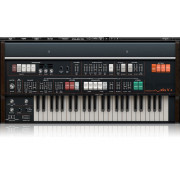You're currently on:
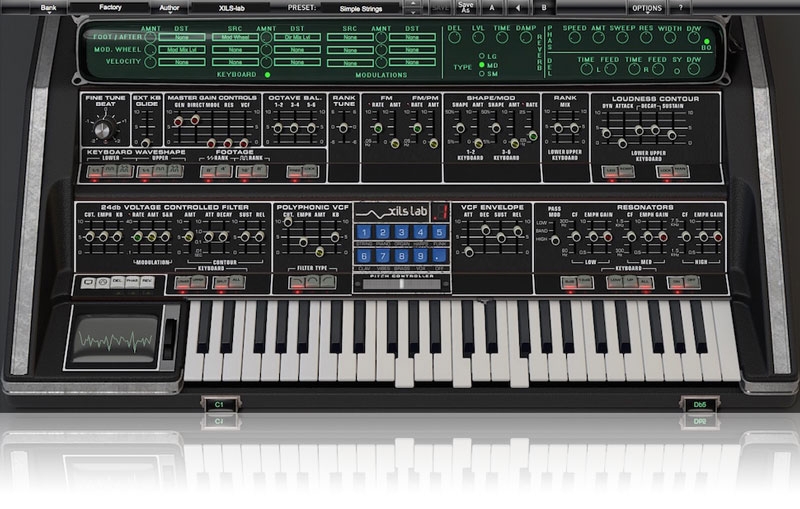
The PolyM
Beyond The Pleasure Principle
Unlimited polyphony, as PolyM's model was considered when released ! Even if it was not true, compared to monophonic synthesisers of these times or to the five or eight voices machines, the 71 voices, each one with its own pulse width modulation, filter, VCA and envelope generator, was clearly a revolution.
Recreating this legendary synthesiser as a virtual analog was a real challenge ! We decided to take up the gauntlet !
A Gem of Pleasure : It took more than two years, analysing, measuring, testing, scratching our heads, but we are proud to now offer you the PolyM, one of the best, if not the best, virtual divided-down based virtual synthesiser out there.
Two Top Octave Divider (T.O.D) oscillators, slightly detuned for an incredible phasing effect and a very special envelope generator are the Heart and the Soul of the PolyM.
The secret of this monster is its hybrid design from an organ like synthesiser and three filter banks, including a 24db ladder filter, driven by a monophonic envelope.
The Sound ! Using divide-down technology offers a particular sound for Chords and Pads you can't find any other way, but that's not all. With that sound, feeding a monophonic zero-delay 24db self-oscillating filter, driven by the keyboard gives you the possibility to play huge Basses or leads as no other synthesiser can do.
But That's not all : Add to this an Acoustic filter bank, a Resonator bank, a Delay, Phaser, Reverb and plenty of modulation possibilities, you can understand why the PolyM gives you so much pleasure when playing it !
Features

Top Octave Divider Oscillators : A technology first invented for organ synthesisers then adapted in more versatile synthesisers back in the 70's. In this technology, a high frequency oscillator is divided in 12 temperated scale interval for producing a full octave, which is then divided by multiple of 2 for creating several octaves. This means that all the notes are locked to a single oscillator and then always played with the same relative phase. This produces a particular sound aside from giving a wide polyphony.
The PolyM reproduces finely this divide-down technology which has been pushed far by adding a polyphonic Pulse Width Modulation.
The two top octave dividers oscillators can run independently in the FREE mode, for small or huge phasing effects. On the other hand, in the LOCK mode, the two oscillators are almost locked in phase, producing a phase modulation, instead of a frequency modulation when the square wave form is modulated in pitch.
The two T.O.D oscillators can be modulated in pitch by an LFO (tempo sync-able) and the Square oscillator has its pulse width modulated by an LFO (tempo sync-able too).
The Keyboard is divided in two parts, Lower and Upper, and for each part, the PWM, waveform mix and envelope decay can be tweaked independently.
The Master Gain control allows you to easily listen to various part of the sound, DIRECT oscillator mixers output, through the MODE acoustic filters, through the RESonator filter bank or through the 24db VCF filter.
The envelope has two modes, LEGacy or ADSR. In the first case, the envelope has been designed to match as close as possible its model and in the other case, it's a standard ADSR (Attack, Decay, Sustain, Release) envelope generator.
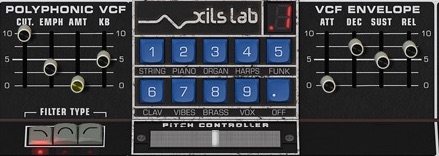
Each note has its own 12db filter, modulated by its own ADSR envelope giving the PolyM much more possibility than a simple Organ like synthesiser, much more than its model which modulated its filter only with the VCA envelope.
Moreover, The PolyM can change the filter type from Low Pass to High Pass and Band Pass.
MODE acoustic filters and presets: The blue buttons are selecting the Acoustic filter ran in the MODE filter bank section. They can also load the PolyM with the original settings for producing specific sounds (Strings, Piano, Organ, Harps, Funk, Clav, Vibes, Brass, Vox). When the DOT button is engaged, only the MODE filter is changed.
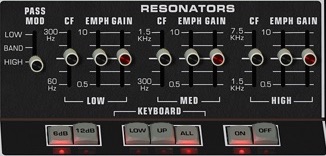
The Resonators filter bank features three parametric filters for which Frequency, Level or Resonance can be adjusted. These filters can be Low Pass, Band Pass or High Pass, 6db or 12db.
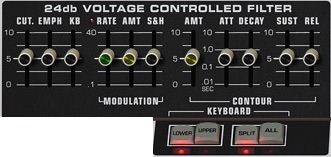
The VCF section (Voltage Controlled Filter) is a 24db self-oscillating ladder filter, created from the XILS-lab zero-delay algorithm. It can be modulated by an LFO (sine, sample and hold) as well as an independent envelope, controlled by the keyboard in a monophonic way.

And finally, In the Advance Settings Panel, you will find 9 Modulation slots, Delay, Phaser and Reverb settings.
Everything to push the PolyM sound possibilities far away from its model, but keeping the pleasure characteristic.
THE LIST, as short as possible : The PolyM offers
Two aliasing-free Top Octave Divider oscillators: One for the Sawtooth, the other for the Square.
The PolyM is available with the following formats (32 and 64 bits):
Mac OSX 10.7 and later : VST, Audio Unit, AAX (32&64 bits, native)
Windows XP, Vista and 7,8,10 ; VST, RTAS (Protools 7.0 and later),AAX (32&64 bits, native)

















